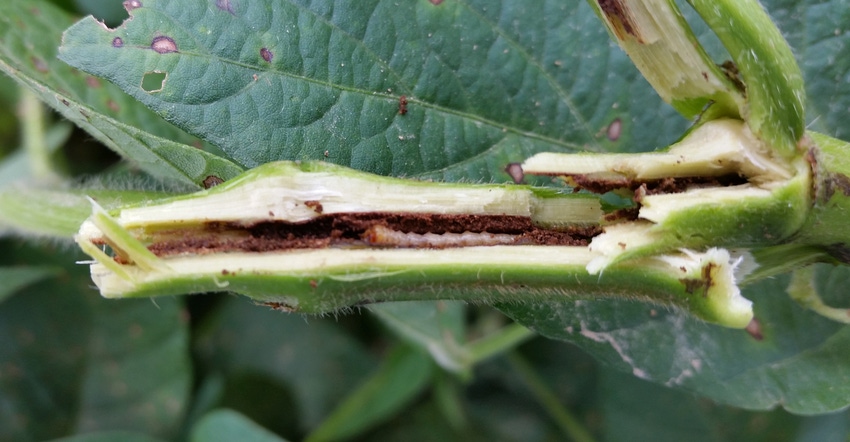September 17, 2021

Help U of I track stem borer in soybeans
University of Illinois entomologists are collecting information on a new-ish soybean pest, the dectes stem borer. The pest showed up in southern Illinois in 2019, where farmers saw stalk breakage and lodging around harvesttime, which was caused by dectes stem borer feeding.
U of I entomologist Nick Seiter is collecting information on stem borer populations across Illinois: where are they most common, how severe are they, and how do populations vary from year to year. He’s looking for volunteers to do the following:
Choose one or more soybean fields. This could be a field where you have had dectes problems in the past, or not; Information is sought on tillage, variety, location and history of dectes stem borer infestation.
Scout the field for tunneling. Between R6 and R8, split the main stem of 25 plants in the field and look for dectes stem borer larvae and their tunnels. Grayish-blue in color, the dectes stem borer is a small, long-horned beetle, about a half inch in length, with antennae that are usually as long, or longer than, the beetle itself.
Send in counts. Seiter will provide a data sheet and protocol for you to follow.
If interested, contact Seiter at [email protected].
So what is soil health, exactly?
A new study from the University of Illinois and Ohio State University reveals that lower-than-ideal adoption of soil conservation practices could be traced back to how people define soil health.
And apparently, farmers, researchers and conservation professionals all have different interpretations of the term.
“We all use the term ‘soil health,’ but upon further discussion, it’s often clear different groups don’t really have the same working definition or interpretation of the term. When we keep talking past one another, assuming we know what the other person means, that’s a potential barrier to greater adoption of good soil management practices,” says Jordon Wade, postdoctoral researcher in the Department of Crop Sciences at U of I.
The study also finds farmers care far more about soil health than scientists and conservation professionals think.
“Many academics think farmers don't value soil health, but our results clearly show it’s a major priority for them. We end up spending so much time trying to convince farmers that soil health is important, but they’re already there,” Wade says. “We need to move on and start recognizing farmers as our colleagues and our equals in what we’re trying to achieve.”
In addition to finding farmers prioritized soil health at a higher level (8.5 out of 10) than academics and NRCS professionals expected (4.9 and 5.7, respectively), the survey revealed surprising agreement about how the groups conceptualized soil health.
The three groups all agreed that soil health positively affects yield and profitability, and they all see links between soil health and fertility. But they still might talk about them differently.
“If I, as a researcher, am talking about improving soil health, I might be thinking about how this could reduce inputs, but an NRCS conservationist might not be,” Wade says. “This means that our takeaways from a conversation about soil health could be quite different.”
When asked about how they used and valued various soil tests, farmers and academics tended to be more similar than NRCS professionals, who, according to the survey, rely more heavily on in-field measurements (e.g., “by feel” or how the ground works up with a tractor) than standard agronomic soil tests (e.g., pH, organic matter, extractable nutrients). All groups said they value soil health tests that incorporate measurements of soil microbial activity, but the survey revealed farmers just aren’t using them.
“Our finding that farmers find soil health tests valuable, but often don’t use them suggests some kind of barrier exists, such as availability or cost of these tests,” Wade says. Plus, Illinois farmers in their research programs see links between soil health and water quality for a given practice. And while they see some practices improve soil health, they don’t necessarily see it as helping water quality.
The upshot? Researchers need to be more explicit in articulating and quantifying how practices that improve water quality may also boost soil health. And overall, talk less about whether soil health is important and more about benefits and how to measure them.
Don’t miss Ag Day at ISU
The Illinois State University Department of Agriculture is holding a special Agriculture Day at the football game Oct. 2.
The event will begin at the Department of Agriculture tent in the Tent Zone near Hancock Stadium at 10 a.m. Lunch will be provided by the ISU Agriculture Alumni Association at 11 a.m. The kickoff for the football game against Missouri State is at 1 p.m.
The first 50 Illinois FFA members and their families to fill out the RSVP form will get free lunch and free game tickets. Complete the RSVP form or email Cori Malone at [email protected].
New farmers to lead Illinois Corn Marketing Board
Toulon, Ill., farmer Mark Wilson was recently elected chairman of the Illinois Corn Marketing Board for 2021-22. Wilson is a Stark County farmer who’s served on ICMB for seven years, representing Bureau, Lee, Marshall, Putnam, Stark and Whiteside counties.
ICMB members elected other officers: Jim Reed, DeLand, as vice chairman; Jon Rosenstiel, Pearl City, as treasurer; and Jeff Scates, Shawneetown, as secretary.
New directors include:
Jon Rosenstiel, Pearl City, District 2, covering Carroll, Jo Daviess, Ogle, Stephenson and Winnebago counties
Art Bunting, Dwight, District 5, covering Grundy, Kankakee, LaSalle and Livingston counties
Ross Pauli, Edwards, District 8, covering Cass, Fulton, Logan, Mason, Menard, Peoria and Tazewell counties
Wayne Rosenthal, Morrisonville, District 11, covering Christian, Effingham, Fayette, Montgomery and Shelby counties
Dale Haudrich, Waterloo, District 14, covering Bond, Clinton, Madison, Monroe, St. Clair and Washington counties
You May Also Like




